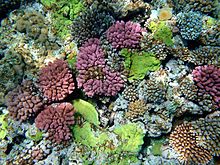Andia Chaves Fonnegra
Andia Chaves Fonnegra | |
|---|---|
| Nationality | Colombian |
| Alma mater | Universidad Jorge Tadeo Lozano Universidad Nacional de Colombia Nova Southeastern University |
| Scientific career | |
| Fields | marine biology marine ecology |
| Institutions | National University of Colombia INVEMAR Smithsonian Tropical Research Institute Universidad Pedagógica Nacional (Colombia) University of Alberta Nova Southeastern University University of the Virgin Islands University of Mississippi Florida Atlantic University |
| Thesis | Increases of excavating sponges on Caribbean coral reefs : reproduction, dispersal and coral deterioration (2014) |
| Doctoral advisor | Jose V. Lopez |
| Other academic advisors | Bernard Riegl, Sven Zea, Mateo Lopez Victoria |
Andia Chaves Fonnegra is a Colombian marine biologist known for her research on the marine sponge Cliona delitrix.
Education and career
[edit]Fonnegra earned her bachelor's degree (2003) in marine biology from the Jorge Tadeo Lozano University and her master's degree (2006) in marine biology from the National University of Colombia.[1] In 2007 she taught at Colombia's Universidad Pedagogic Nacional before moving to the University of Alberta where she was a graduate student from 2007 to 2008. In 2009, she transferred to Nova Southeastern University, in Florida, where she graduated in 2014 with a PhD in oceanography and marine biology.[1][2] Fonnegra's dissertation was "Increase of Excavating Sponges on Caribbean Coral Reefs: Reproduction, Dispersal, and Coral Deterioration".[3]

Fonnegra was a postdoctoral researcher at the Coral Reef Restoration, Assessment & Monitoring (CRRAM) Laboratory - Nova Southeastern University in 2014-2015, later at the Center for Marine and Environmental Studies (CMES) - University of the Virgin Islands in 2016-2017, and also at the Department of Biomolecular Sciences - University of Mississippi in 2018. In 2018, she became an assistant professor at Florida Atlantic University, where she has a joint appointment between the Harbor Branch Oceanographic Institute and the Harriet Wilkes Honors College.[2] She is known for her research on the marine sponge Cliona delitrix,[4] an organism that grows between the calcium carbonate that forms the skeleton of coral reefs and that, through an excavating action, gradually deteriorates the coral.[5] In the Caribbean Sea the development of this sponge has accelerated in recent years, resulting in the gradual erosion of corals, altering the ecosystem.[6][7]
Awards and honors
[edit]- 2002 – SIGMA XI Grant Award, Scientific Research Society[8]
- 2006 – Meritorious Mention Master's Thesis, Universidad Nacional de Colombia[citation needed]
- 2008 – Donald Ross Academic Merit, University of Alberta[9]
- 2010 – NSU Chancellor´s Faculty Research and Development Grant, Nova Southeastern University[10]
- 2011 – L'Oréal-UNESCO Scholarship for Women in Science[11][12][6]
- 2014 – Student Life Achievement Award, Nova Southeastern University[13]
- 2019 – Gulf Research Program’s Early-Career Research Fellowships of The National Academies of Sciences, Engineering and Medicine.[14]
- 2023 - NSF Early Career Award, Florida Atlantic University[15]
Selected publications
[edit]- Chaves-Fonnegra, Andia; Castellanos, Leonardo; Zea, Sven; Duque, Carmenza; Rodríguez, Jaime; Jiménez, Carlos (2008). "Clionapyrrolidine A—A Metabolite from the Encrusting and Excavating Sponge Cliona tenuis that Kills Coral Tissue upon Contact". Journal of Chemical Ecology. 34 (12): 1565–1574. doi:10.1007/s10886-008-9565-5. PMID 19023625. S2CID 21404694.
- Chaves-Fonnegra, Andia; Zea, Sven (2011). "Coral colonization by the encrusting excavating Caribbean sponge Cliona delitrix". Marine Ecology. 32 (2): 162–173. Bibcode:2011MarEc..32..162C. doi:10.1111/j.1439-0485.2010.00416.x.
- Chaves-Fonnegra, Andia; Maldonado, Manuel; Blackwelder, Patricia; Lopez, Jose V. (2015). "Asynchronous reproduction and multi-spawning in the coral-excavating sponge Cliona delitrix". Journal of the Marine Biological Association of the United Kingdom. 96 (2): 515–528. doi:10.1017/S0025315415000636. hdl:10261/121387. ISSN 0025-3154. S2CID 52486029.
- Chaves-Fonnegra, A. (2014). Increase of excavating sponges on Caribbean coral reefs: Reproduction, dispersal, and coral deterioration. Dissertation. Nova Southeastern University.
- Chaves-Fonnegra, Andia; Feldheim, Kevin A.; Secord, Jesse; Lopez, Jose V. (2015). "Population structure and dispersal of the coral-excavating sponge Cliona delitrix". Molecular Ecology. 24 (7): 1447–1466. doi:10.1111/mec.13134. PMID 25732628. S2CID 4492547.
- Brandt, Marilyn E.; Olinger, Lauren K.; Chaves-Fonnegra, Andia; Olson, Julie B.; Gochfeld, Deborah J. (2019). "Coral recruitment is impacted by the presence of a sponge community". Marine Biology. 166 (4). doi:10.1007/s00227-019-3493-5. S2CID 91626018.
References
[edit]- ^ a b Andia Chaves Fonnegra, Curriculum Vitae (in Spanish) Colciencias (colciencias.gov.co)
- ^ a b "Andia Chaves Fonnegra, Curriculum Vitae". Laboratory of Marine and Coastal Ecology, Florida Atlantic University.
- ^ Chaves-Fonnegra, Andia (2014-04-01). "Increase of Excavating Sponges on Caribbean Coral Reefs: Reproduction, Dispersal, and Coral Deterioration". HCNSO Student Theses and Dissertations.
- ^ Chaves-Fonnegra, Andia; Zea, Sven (2011). "Coral colonization by the encrusting excavating Caribbean sponge Cliona delitrix". Marine Ecology. 32 (2): 162–173. Bibcode:2011MarEc..32..162C. doi:10.1111/j.1439-0485.2010.00416.x. ISSN 1439-0485.
- ^ Kaye, Ken (February 21, 2014). "'Beautiful' sponge threatens reefs". South Florida Sun Sentinel.
- ^ a b Andia Chaves Fonnegra: científica colombiana ganadora de premio internacional Archived 2019-03-23 at the Wayback Machine Colciencias, 2 March 2011
- ^ "La científica Andia Chaves explica la situación de los corales". El Tiempo. 23 March 2011.
- ^ "Grants in aid of research recipients" (PDF). Archived (PDF) from the original on 2020-07-31.
- ^ "A celebration of research and innovation" (PDF).
- ^ NSU. "Reproduction and Spread of Cliona delitrix Excavating Sponge on Coral Reefs". NSU. Retrieved 2023-05-24.
- ^ "Outstanding women scientists to receive 2011 L'ORÉAL-UNESCO Awards (3 March) and Fellowships (2 March)". Archived from the original on 2016-11-15.
- ^ "Outstanding women scientists to receive 2011 L'ORÉAL-UNESCO Awards and Fellowships". Geneva, Switzerland: UNESCO. 25 February 2011.
- ^ "Student life achievement awards". Archived from the original on 2020-11-25.
- ^ Galoustian, Gisele (September 30, 2019). "Faculty Receive National Academies' Early-Career Research Fellowships". Archived from the original on 2019-10-02.
- ^ "NSF Award Search: Award # 2238537 – CAREER: Integrating Ecological Principles of Sponge-Dominated Coral Reefs in the Education Curricula". www.nsf.gov. Retrieved 2023-05-24.
External links
[edit]- Andia Chaves Fonnegra publications indexed by Google Scholar
